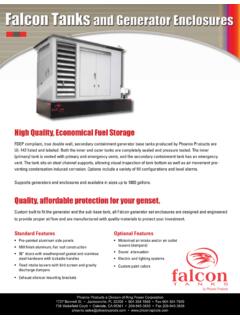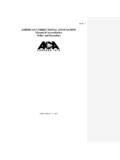Transcription of National Fire Protection Association Standards
1 NFPA0408 National Fire Protection Association StandardsNFPA 20: Standard for the Installation of Stationary Pumps for Fire Protection . 2003 Edition. Copyright, nfpa , Inc., Quincy, Massa-chusettsChapter 8 Fuel Supply Maintenance, states that Tanks shall always be filled by means that will ensure removal of all water and foreign material . nfpa 25: Standard for the Inspection, Testing and Maintenance of Water-Based Fire Protection Systems. 2002 Edition Copyright, nfpa , Inc., Quincy, Massachusetts Annex B calls for a maintenance schedule to make sure that diesel systems are free of water.
2 nfpa 110: Standard for Emergency and Standby Power Systems, 2005 edition. Copyright, nfpa , Inc., Quincy, Massachusetts Chapter 7 Installation and Environmen-tal Considerations, states that Fuel system design shall provide for a supply of clean fuel to the prime mover . Chapter 7 Installation and Environ-mental Considerations, states that Fuel piping shall be of compatible metal to minimize electrolysis and shall be properly sized, with vent and fill pipes located to prevent entry of ground water or rain into the tank. Chapter 7 Installation and Environmen-tal Considerations, states that Tanks shall be sized so that the fuel is consumed within the storage life or pro-vision shall be made to replace stale fuel with clean fuel.
3 Chapter 8 Routine Maintenance and Operational Testing, states that A fuel quality test shall be performed at least annually using tests approved by ASTM Standards . Annex A Explanatory Material, states that Commercial distillate fuel oils used in modern diesel engines are subject to various detrimental effects. The origin of the crude oil, refinement processing techniques, time of year, and geographical consumption location The following excerpts are provided solely for your Bennett St. Jacksonville, FL 32206 904-354-1858 Fax 904-634-0063subject to extreme daily temperature variations cause fuel to degrade more rapidly.
4 This is further exacerbated with large aboveground tanks that are less than full. Airspace allows for conden-sation that can further add to the con-taminant levels. Reflective exterior tank coatings reduce but do not eliminate the solar heating effect. Scheduled fuel maintenance and test-ing help to reduce or nearly eliminate fuel contamination. Fuel maintenance filtration can remove contaminants and water and return fuel to conditions where it will provide reliability and efficiency for standby generators when called upon in emergency conditions. Fuel maintenance and testing should begin the day of instal-lation and first fill to establish a bench-mark guideline for further comparison.
5 Fuel monitoring and testing services are available nationwide from many different companies. all aid in the determination of fuel blend formulas. Sulfur, naturally occurring gums, waxes, soluble metallic soaps, water, dirt, and temperature all begin to degrade fuel as it is handled and stored. These effects begin at the time of fuel refinement and continue until consumption. Proper fuel storage is critical to engine start-up, efficiency, and longevity. Stor-age tanks should be kept water-free and have provisions for drainage on a scheduled basis.
6 Water can contribute to steel tank corrosion and the potential development of microbiological growth where fuel and water interface. Copper and its alloys, along with zinc or zinc coatings, should be avoided in fuel-han-dling systems. These elements can react with fuel to form certain gels or organic acids, resulting in clogging of filters or further system corrosion. Stable stor-age temperatures are conducive to fuel health. Tanks that are aboveground and nfpa 110: Standard for Emergency and Standby Power Systems, 2005 edition. Copyright, nfpa , Inc., Quincy, Massachusetts, continu








